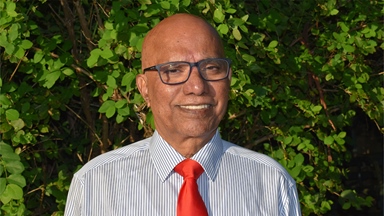Loading component...
At a glance
Growing up on a coconut plantation in Malaysia, Dr Appadu Santhariah CPA experienced generational poverty first-hand.
His father, an indentured agricultural worker, earned 60 Malaysian ringgit (about A$20) a week and, to support his wife and a large family, did odd jobs such as selling ice cream from a bicycle.
Santhariah, together with his mother and siblings, also contributed to the family’s survival, opening a stall selling tea, coffee, noodles and home-made banana fritters.
“Most of the time the workers were too poor to pay cash, so our sales were mostly on credit,” he says. “I was 13 and I kept the books and did a debt collection task to collect the money on payday. This gave me first-hand experience of how to manage money in a business environment.”
Yet it was a job as an articled clerk at a British chartered accounting firm, from 1972 to 1977, that would cement his passion for accounting and finance and admitted him to the Fellowship of Certified Practising Accountants.
It paid £12 (A$21) a week – much of which was sent back to his family in Malaysia – an amount that he supplemented by working as a hostel cook. However, it also provided him with a learning foundation, as well as an introduction to a tax around which he has continued to build expertise – the Value-Added Tax (VAT), or Goods and Services Tax (GST) as it is referred to in countries such as Australia and Malaysia.
In fact, after retiring at the age of 64, he completed research on Malaysian GST for a masters in taxation at the University of New South Wales and, at the not-too-tender age of 73, gained a PhD for his thesis on Malaysian GST compliance costs of taxpayers at RMIT University. A series of articles on GST in its many forms, for international tax journals, followed.
“Learning is the best anti-ageing drug I know,” says Santhariah.
After leaving London in 1981 to return home, the Telugu accountant, for whom English is his second language, obtained a position in the Central Bank of Malaysia. There he learned banking skills such as foreign loans, forex and how domestic banks operated.
In 1983, he joined the Swedish-owned Malaysian Match Company as financial controller, gaining knowledge of manufacturing financial accounting, human resources and labour relations. He was seconded to New Zealand in 1986 to work in a consultancy role setting up a general, computer-based accounting system incorporating GST.
Two years later, Santhariah was seeking a new challenge and took a role as a financial controller for Wool Auctions of Australia.
“I had to learn the role quickly to work with Aussies who were mostly from sheep farms, as well as the accounting and audit standards applicable in Australia,” he says. “I also had to convert the manual bookkeeping to a computer-based accounting system.”
During this time, Santhariah completed his CPA studies and a master of business administration (MBA) in international business from the University of Western Sydney. “I wanted to work in an international company as a financial controller, and the MBA gave me the springboard,” he says. His next appointment, from 1996 to 2010, was with Tarkett, a multinational company with a turnover of A$40 million and 42 employees, as finance and administration manager.
“This appointment was more challenging since I was reporting to headquarters in Paris and oversaw financial and management reports as well as human resources, taxation matters and audits.”
Santhariah also brought accounting and administration procedure in line with Australian and international standards and, again, implemented GST reporting accounting.
The only member of his family to graduate from university, Santhariah says his experiences and hardship during childhood reinforced a sense of discipline that allowed him to escape the poverty trap.
“Where there is a will, there is a way to achieve success in business and education and break the poverty cycle.”
Both his daughters attended university, graduating at the same time he finished his PhD studies.
Santhariah embraces Hindu Karma yoga, which embodies the belief that we have a social and moral debt to repay to society what has been given to us, and this is evident in his many charitable commitments that have included work for church, education and Indigenous services groups.
He says his achievements so far have been due to help rendered by kind people along his journey.
Recently, he earned a certificate of appreciation for services to the underprivileged at the World Humanitarian Drive.
Currently, the retired accountant is gathering a like-minded community of professionals who can offer free advice to small businesses via Zoom and give regular talks on financial topics to the Malaysian small business community.
His career and life philosophy continues to be heavily influenced by his strong beliefs in both continuing education and helping others.
One piece of advice
“Don’t be idle or retire and say you want to play golf. Spare some time to help others and you will activate regions of the brain associated with pleasure, social connection and trust.”

